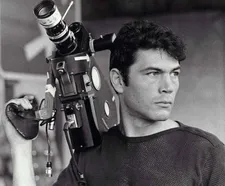 |
| Haskell Wexler: “He was the first cinematographer in over 35 years to receive a star on Hollywood’s Walk of Fame." |
He photographed a wide range of films that earned him five Academy Award nominations and two Oscars for Best Cinematography for Mike Nichols’ Who’s Afraid Of Virginia Woolf? in 1966 and a decade later for Hal Ashby’s Bound For Glory. He also photographed the Oscar-winning short-subject documentary Interviews With My Lai Veterans in 1971.
His Academy Award nominations came for his work on his first feature documentary, The Living City; a short film, T for Tumbleweed; Milos Forman’s One Flew Over the Cuckoo’s Nest; John Sayle’s Matewan; and Ron Shelton’s Huey Long biopic Blaze.
Born in Chicago, Wexler attended the University of California, Berkeley, for a year before joining the Merchant Marines. He stayed at sea for five years, became a second officer, then returned to Chicago where he spent ten years making documentary and educational films before moving to California in 1955.
Among Wexler’s many credits are three seminal films for Norman Jewison: In The Heat Of The Night, The Thomas Crown Affair and Other People’s Money as well as George Lucas’ American Graffiti and Dennis Hopper’s controversial hit, Colors.
 |
| Robert Forster as he appeared as the cameraman in Haskell Wexler’s Medium Cool - hailed as
“guerrilla-filmmaking confronts traditional Hollywood practices.” |
He also directed and wrote Latino in 1985 set in Nicaragua as well as a film about US union leader Harry Bridges From Wharf Rats To Lords Of The Docks, adapted from a stage play. He was politically minded and directed a number of documentaries with social and topical themes including Introduction To The Enemy (1974), shot in Vietnam with Jane Fonda; No Nukes (1980); and Target Nicaragua: Inside A Covert War (1983), directed by Saul Landau.
Wexler was elected by the Academy of Motion Picture Arts and Sciences to the Board of Governors to represent the cinematographers’ branch. He has also received the American Society of Cinematographers’ Lifetime Achievement Award and he was the first cinematographer in over 35 years to receive a star on Hollywood’s Walk of Fame.
Wexler came to the Edinburgh International Film Festival earlier this year for an In Conversation session hosted by EIFF honorary patron Seamus McGarvey during which he met young filmmakers, students and the public. On that occasion a documentary about his father by one of his two sons Mark Wexler Tell Them Who You Are was shown. His other son Jeff works in the industry as a sound mixer.
As well as his sons Wexler who died “peacefully in his sleep" is survived by his third wife, the actress Rita Taggart whom he married in 1989 as well as a daughter Kathy.
























